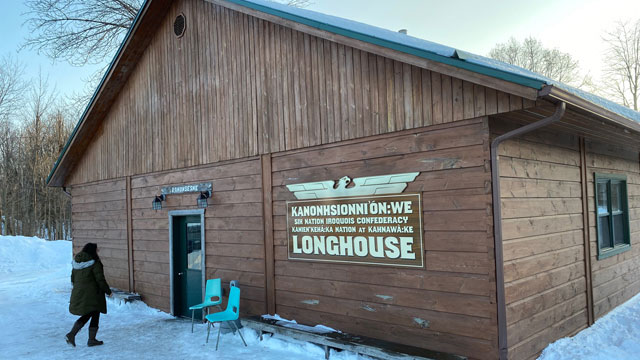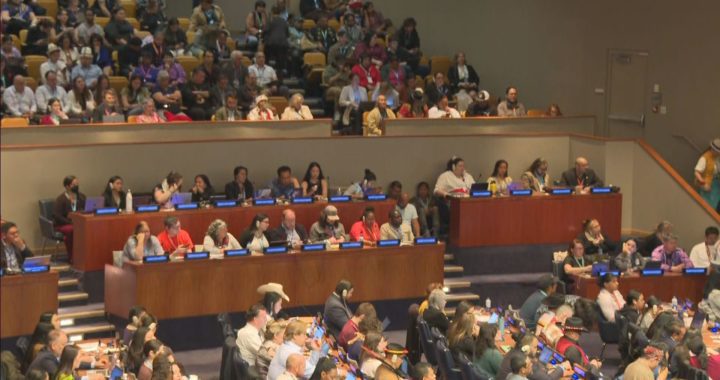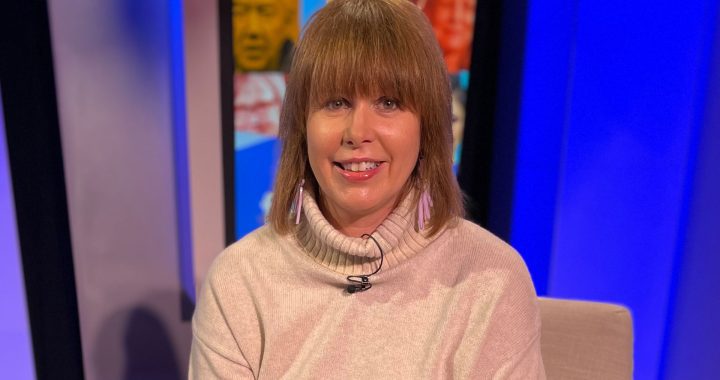
With smoke from a sacred fire curling around them, elders from Kahnawake’s longhouses greeted the approaching Wet’suwet’en hereditary chiefs.
The Mohawks then performed a welcome ceremony known as “the words of at the edge of the woods.
“In our tradition when we have people coming from other places, we greet them when they come at the edge of the woods into our nation,” explained Kenneth Deer, secretary of the Mohawk Nation at Kahnawake.
“Then what we do is we symbolically clean them off, we clean the burs and everything they’ve accumulated on their clothes, we also clean their ears, so they can hear clearly, then the same thing with their eyes, their eyes might be dirty, filled with dust and they may have seen things that disturbed them, and the last part is we give them water to clear their throat so they can speak clearly.”
At the end of the ceremony, dozens of Mohawks and other guests entered the Longhouse, followed shortly after by the hereditary chiefs who were drummed in with accompanying Wet’suwet’en singers as is their tradition.
Then the meeting between nations began in earnest.
“They explained their history, they explained the situation that they’re in, difficulties they’ve had with the RCMP,” said Deer during a break in talks. “It was touching.”
“The reason why we are here is so we can express our friendship and our support, our gratitude to the Kahnawake people,” added hereditary Chief Woos of Kyas Yax (Grizzly house).
(Kenneth Deer outside the meeting in Kahnawake. Photo: Tom Fennario/APTN)
Located just south of Montreal, Kahnawake is famous for barricading the Mercier bridge during the 1990 Oka crisis in support of Kanesatake, their Mohawk sister community. Presently, Kahnawake has been blocking a commuter train that passes through their land for nearly three weeks in support of the hereditary chiefs and their supporters.
The Coastal Gaslink (CGL) pipeline is a $6.6 billion project that will carry fracked natural gas from Dawson Creek in northeastern B.C., to Kitimat on the coast where it will be processed and shipped to Asian markets.
Twenty elected First Nation councils along the route have signed impact benefit agreements worth millions in employment spinoffs according to the company.
But five hereditary chiefs who claim control over their territory have been vehemently opposed to the project.
In January 2019, when members and supporters of the Wet’suwet’en nation blocked the Road that leads to the construction site, the RCMP moved in. 14 people were arrested.
The scene was repeated nearly a year later when on Feb. 6, when RCMP enforced a Dec. 31 injunction and cleared out the camps along the road paving the way construction to begin again. More than two dozen were arrested.
Protests then erupted across the country including along side the Canadian National railway tracks outside the Tyendinaga Mohawk Territory, followed shorty thereafter by others, such as the current blockade in Kahnawake.
Mohawks have stated that they will continue to block rail lines until the request of the Wet’suwet’en hereditary chiefs are met.
In that regard, there appears to be a stand off.
“We’re waiting for the RCMP to vacate the premises,” said Woos.
In his Friday press conference, Prime Minister Justin Trudeau placed the onus on First Nations leaders to end the various blockades across Canada “now.”
(The Longhouse in Kahnawake where the meeting between Mohawk leadership and Wet’suwet’en hereditary chiefs. Photo: Tom Fennario/APTN)
But the hereditary chief has declined to back down.
In order to enable what he called a “path to peace,” hereditary chiefs demand for the complete removal of RCMP from the disputed area, an end of Coastal Gaslink activities, and a meeting with federal and provincial governments.
“It seems to me ever since Mr.Trudeau has made his announcement, communication has ceased,” stated Woos.
A recent report by the environmental agency that oversees resource projects in British Columbia may offer anti-pipeline Wet’suewet’en activists an element of hope.
It has decided to put a portion of the CGL project on hold, and is asking for two specific requirements to be fulfilled specifically; “How Aboriginal Traditional Knowledge was gathered and incorporated,” into CGL’s impact report, and a request “that the approach to gathering this information and the results be respectfully and appropriately presented when possible.”
The agency is also asking for additional information regarding the “opportunities CGL provided to Indigenous nations to be involved (e.g., who was involved, what role).
The company however says the request for more information won’t delay the start to the spring construction season.
“Go figure right, with all this happening it just goes full circle.,” said Woos in response, who then referenced a 1997 supreme court decision “We’ve said right from the beginning the rule of law that applies is the Delgamuukw of 1997. The duty to consult with Wet’suewet’en hereditary chiefs is our expectation.”
The delegation of Wet’suewet’en hereditary Chiefs are flying back to BC on Sunday. When asked what his plans were upon his return, Woos did not express any urgency to meet the demands of Canada to end blockades.
Rather, he intends to return to his own edge of the woods.
“Rest up, spend a little time my family, and go back to my Yintah, my land.”
The hereditary chiefs met with leaders of the Tyendinaga Mohawk Territory Friday.
In a news conference following that meeting, Mohawk vowed to keep the protest site up by the side of the CN rail line until the RCMP leave the Wet’suwet’en territory.










“Twenty elected First Nation councils along the route have signed impact benefit agreements worth millions in employment spinoffs according to the company.”
– WHERE ARE THEY? Do they have a pipeline going through THEIR territory, destroying their traplines, threatening their women with mancamps, destroying their water on their UNCEDED land?
Right on with the right on! Fight the racist, colonial power of Canada and their energy gangster corporations!! Our People shall win!